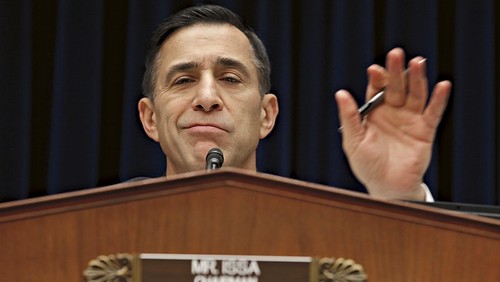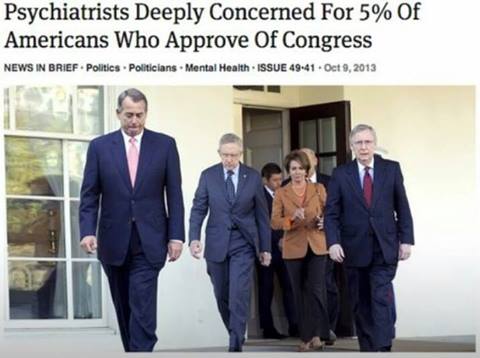pbmus
pbmus's JournalIssa Pushes Forward With His Own Benghazi Investigation
" "
"
Just days after the House voted to impanel a select committee to investigate the Sept. 11, 2012, attacks on the U.S. Consulate in Benghazi, House Oversight and Government Reform Committee Chairman Darrell Issa signaled that he will continue his own separate investigation into the attacks.
The California Republican on Thursday issued another subpoena to Secretary of State John Kerry, calling on the former senator—who was serving in the Senate at the time of the attack—to appear before the Oversight Committee on May 29. Earlier this month, the same day that House Speaker John Boehner announced his intention to form a select committee on the matter, Issa issued a subpoena requiring Kerry to appear before the committee on May 21, but changed the date due to a conflict with Kerry's scheduled trip to Mexico that week.
"The State Department had discussed May 29 as a possible alternative date and that's when Secretary Kerry will be obligated to appear—further accommodation will not be possible," Issa said in a statement. "Absent an assertion of executive privilege, the State Department has a legal obligation to fully and completely comply."
Boehner said at the time that he supports Issa's subpoena, and spokesman Michael Steel confirmed Thursday that that remains the case.
http://www.nationaljournal.com/congress/despite-select-committee-issa-pushes-forward-with-his-own-benghazi-investigation-20140515
--------------------------------------------------------------------------------------------------------------
This guy is BENGHAZI ...
Pesticides, Not Mites, Cause Honeybee Colony Collapse
Researchers racing to find the cause of Colony Collapse Disorder (CCD), which has been killing off honeybees in much of the U.S. and Europe, are zeroing in on the culprit. And — surprise — mites are apparently no longer suspects. But cold winters may be accomplices to the crime.
Studying colonies of honeybees (Apis mellifera L.) at three locations in central Massachusetts during the 2012-13 winter, researchers found that two widely-used pesticides were directly responsible for the hive abandonment and death of several colonies. Comparing their results to previous research, the scientists noted that colder winters may aggravate the negative effects of the pesticides.
Pesticide Spread
For the study, appearing today in the Bulletin of Insectology, researchers monitored 18 bee colonies — six in each location — from October 2012 through April 2013. A third of the colonies were exposed to low doses of the pesticide imidacloprid, while another third were exposed to the pesticide clothianidin. Both pesticides belong to the neonicotinoid class and are commonly used in agriculture. The remainder of the colonies were left untreated.
The numbers of bees declined in all 18 colonies with the onset of winter weather, which is the usual seasonal pattern.
http://blogs.discovermagazine.com/d-brief/2014/05/09/pesticides-not-mites-cause-honeybee-colony-collapse/#.U3G3rEZdWSp
Beyond Honeybees: Now Wild Bees and Butterflies May Be in Trouble
By now you probably know about the plight of America’s honeybees: the collapsed colonies and dying hives, threatening pollination services to crops and the future of a much-beloved insect.
But it’s not just honeybees that are in trouble. Many wild pollinators—thousands of species of bees and butterflies and moths—are also threatened. Their decline would affect not only our food supply, but our landscapes, too. Most honeybees live in commercially managed agricultural colonies; wild pollinators are caretakers of our everyday surroundings.
“Almost 90 percent of the world’s flowering species require insects or other animals for pollination,” said ecologist Laura Burkle of Montana State University. “That’s a lot of plants that need these adorable creatures for reproduction. And if we don’t have those plants, we have a pretty impoverished world.”
Compared to honeybees, wild pollinators are not well studied, and their condition has received relatively little public attention. Most people don’t realize that there are thousands of bee species in the United States. Even many butterflies are overlooked, with the plight of just a few species, particularly monarchs, widely recognized.
http://www.wired.com/2014/05/wild-bee-and-butterfly-declines/?mbid=social_twitter
11 Things You Should Know Right Now About Honey Bees
1. A hive of honey bees will fly 90,000 miles, the equivalent of three orbits around earth, to collect 2.2 pounds of nectar to produce honey.
http://www.buzzfeed.com/jimbeam/things-you-should-know-about-honey-bees-right-now
7 ways pesticide companies are spinning the bee crisis to protect profits
Bees and other pollinators are essential for two-thirds of our global food crops, from apples to watermelons.1 Bee pollination of crops has been valued at $20 billion in the United States2 and $217 billion globally.3,4 Unfortunately, bees and other pollinators are in great peril, with populations rapidly declining worldwide. A strong and growing body of evidence points to exposure to a class of neurotoxic pesticides called neonicotinoids–the fastest-growing and most widely used class of synthetic pesticides–as a key contributing factor to bee declines.5,6,7
Neonicotinoids (also called neonics) are used as seed treatments on more than 140 crops. Virtually all corn and a large percentage of soy, wheat and canola seeds planted in the U.S. are pretreated with neonics, despite research finding that this practice usually doesn’t increase crop yields or benefit farmers.8 Neonics are systemic pesticides that are taken up through roots and leaves and distributed throughout the entire plant, including pollen and nectar. They are persistent and accumulate over time in the environment.
Numerous studies reveal that neonicotinoids can kill bees outright by attacking their nervous systems, while low levels of exposure have been shown to disrupt foraging abilities,9 navigation, learning, communication, memory10 and suppress the immune systems of bees, making them more vulnerable to disease and pests.11 While other factors have been identified as possible contributors to bee declines and hive failure–such as pests,12 diseases, loss of forage and habitat13 and changing climate14--neonicotinoid pesticides are a core problem that must be addressed. Science shows that exposure to neonics is a compounding factor that increases bee vulnerability and decreases natural resilience to external stressors such as varroa mite pests and pathogens.15,16,17,18,19
http://libcloud.s3.amazonaws.com/93/f0/f/4656/FollowTheHoneyReport.pdf
--------------------------------------------------------------------------------
Poison does kill bees and people and other living things
Politicians appear in denial on climate change
WASHINGTON – If a politician were told that, after lengthy study and analysis, more than 97 percent of political observers concluded that that politician was going to lose, do you think such a warning would spur a campaign to immediate action?
Of course. Unless the politician was delusional.
Well, consider this: Precisely that overwhelming percentage of scientists involved in climate research have concluded that there has been “unequivocal” warming of the Earth’s average global temperature in recent decades and that human-generated greenhouse gases are mostly responsible.
But while it is evident that the science of climate change, also known as global warming, is convincing and conclusive, it is not an exaggeration to say that the politics of an issue that will determine the fate of the planet is quite unsettled.
Last week, the Obama administration released a landmark, 800-page climate assessment report that essentially told the public that climate change is a threat and is affecting every part of the nation (and, of course, the rest of the globe). The sea levels are rising, floods and storm surges are more severe, rains are more intense in the Northeast, droughts and wildfires more pronounced in the West. The changes are affecting or will affect, among other things, where we live and work, how healthy we are, what we grow and what we eat and what other species will thrive or perish, including us.
http://www.courier-journal.com/story/news/politics/carroll/2014/05/09/politicians-appear-denial-climate-change/8917045/
------------------------------------------------------------------------------------------------
Or they are paid to be in denial
Realistic Universe Simulation
Profile Information
Member since: Wed Aug 22, 2012, 08:01 PMNumber of posts: 12,422
 "
" "
"